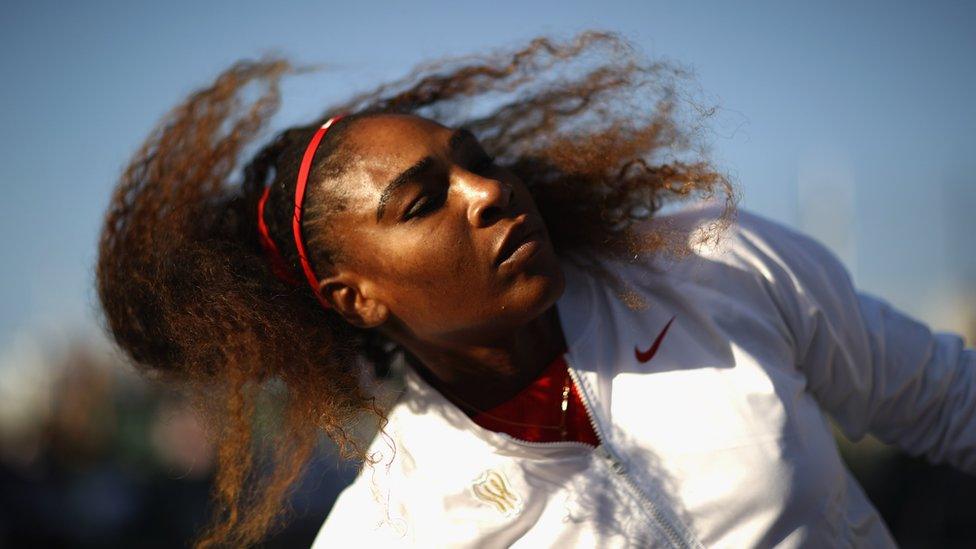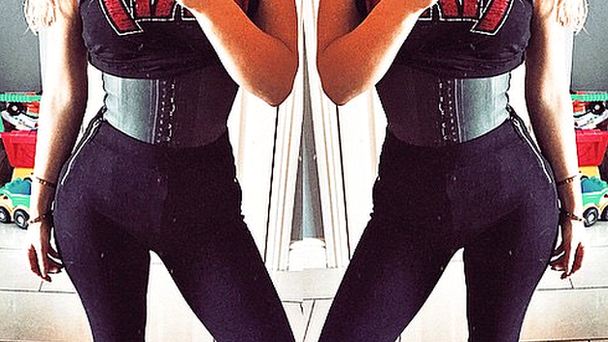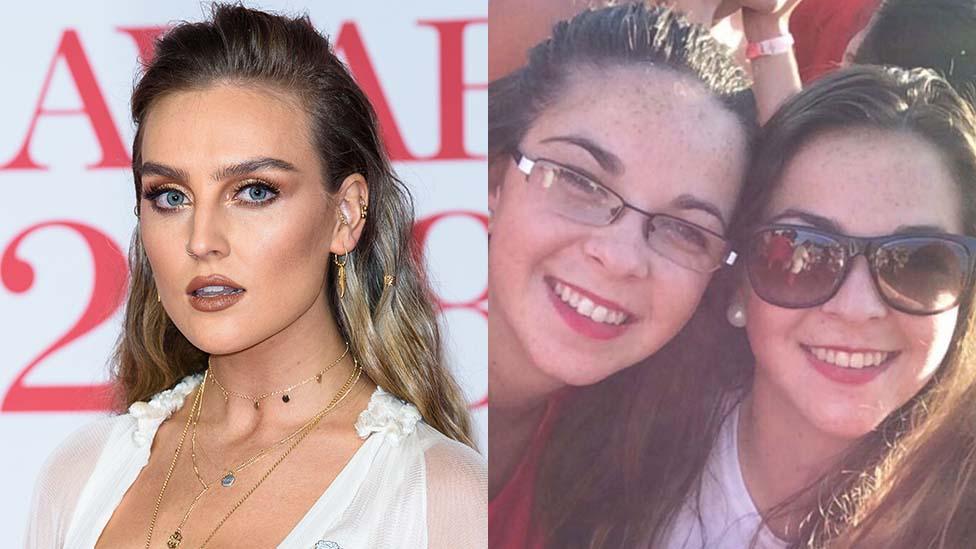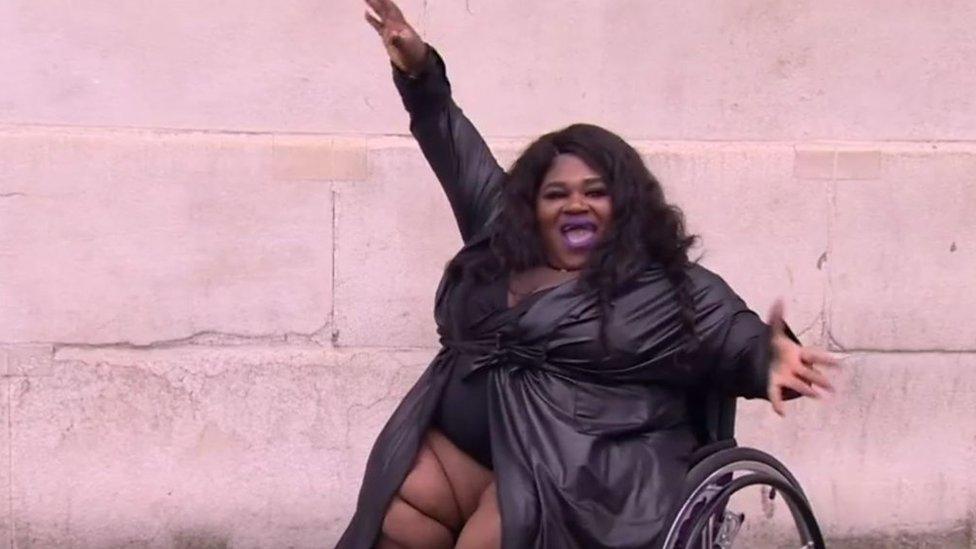Serena Williams, motherhood and Instagram pressure
- Published

Serena Williams says women face "a lot of pressure" over how they look
A quick scroll through Serena Williams' Instagram account produces a picture of a woman who has everything: a beautiful family, a successful career and some amazing holidays.
But in a searingly honest interview with Time magazine, the tennis star has admitted that even she fell prey to social media pressure after her daughter was born.
A shot of her post-pregnancy figure, she said, was created with the help of a waist trainer - a corset-like device used to squeeze the waistline - and was not a true reflection of reality.
"I hated that I fell victim to that," she told the magazine, external, adding: "It puts a lot of pressure on women, young and old."
That pressure coming from endless social media posts is something Nat, a mother-of-two from Cornwall in the UK, recognises.
"There are different levels of it," she says. "There is your 'look at me, I've-bounced-back-in-three-weeks' celebrities, like Kim Kardashian.
"And then there are the ones that worry me more - the ones I feel myself being sucked in - who talk the talk, but are still selling something."
You don't need to look far to see what she is talking about: Instagram is full of both celebrities and so-called "everyday" mums showing off their idyllic lifestyles.
Allow Instagram content?
This article contains content provided by Instagram. We ask for your permission before anything is loaded, as they may be using cookies and other technologies. You may want to read Meta’s Instagram cookie policy, external and privacy policy, external before accepting. To view this content choose ‘accept and continue’.

And that can be demoralising, acknowledges Natalie Lee, a former midwife turned social media influencer who runs Style Me Sunday.
"After you have a baby, you are really vulnerable," she told the BBC. "Definitely you are more likely to compare yourself to other mums, and unfortunately, Instagram is the perfect tool to allow you to do that.
"It preys on insecurities."
But there is money to be made from these insecurities, and waist trainers are just one of the products celebrities and "Insta-famous" mums are known to promote to their followers.
Kylie Jenner - with her 113 million followers - used her account to advertise a "snap back" package, complete with post-partum "sweat belt", a little over a month after giving birth to her first child, Stormi.
Allow Instagram content?
This article contains content provided by Instagram. We ask for your permission before anything is loaded, as they may be using cookies and other technologies. You may want to read Meta’s Instagram cookie policy, external and privacy policy, external before accepting. To view this content choose ‘accept and continue’.

But the use of items such as waist trainers in the days and weeks following birth is the kind of thing that concerns Dr Galyna Selezneva, an aesthetic medical doctor at Dr Rita Rakus in London.
"When you've just had a baby, your body takes its time to reduce the area which kept the baby while you were pregnant," she tells the BBC. "If you are putting pressure on it straight away, forget about it."
But Dr Selezneva knows all too well the impact that social media is having on mums.
"I've seen mothers coming in as soon as a couple of weeks, the reason being that all the celebrity new mothers seem to have recovered within weeks: they are running, wearing crop tops.
"Sometimes people are very lucky - but this does not mean each and every new mother should get back to her pre-pregnancy shape instantly."
In fact, it can take as long as a year, Dr Selezneva says.
'New mums can't relate to six packs'
"The problem is nobody ever talks about what happens to your body afterwards, and then you are looking at these people thinking, am I normal?" Nat says.
"Actually, you are normal - but nobody has told you what normal looks like."
Not being able to see what "normal" looked like was one of the things which inspired Norwegian Instagrammer Tina Valaker Brotke to document her life with her seven-month-old daughter Philippa.
"It's funny, because everyone goes through the same thing but no one talks about it," she tells the BBC from her home in Norway's capital, Oslo.
"I can see if I post a picture how many can relate to it. Nobody can relate to someone with a six pack weeks after having a baby."
Allow Instagram content?
This article contains content provided by Instagram. We ask for your permission before anything is loaded, as they may be using cookies and other technologies. You may want to read Meta’s Instagram cookie policy, external and privacy policy, external before accepting. To view this content choose ‘accept and continue’.

As for whether Instagram is a good or bad place for new mums, "it's a bit of both," Tina says.
"The good thing is you can choose who to follow," she adds.
And choosing who to follow is key, according to Natalie.
"Instagram is a real chance to seek out those accounts which can have a really positive impact on mental wellbeing. There are lots of really good accounts which can help new mums feel comfortable."
And that's good news because - as Nat points out - when you're breastfeeding at 03:00, there isn't much else to do but scroll through your social media feeds.
- Published5 May 2015

- Published15 August 2018

- Published19 July 2018
